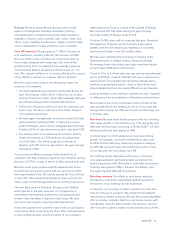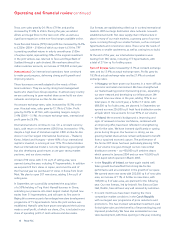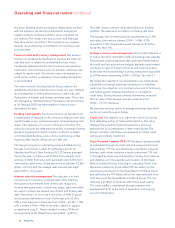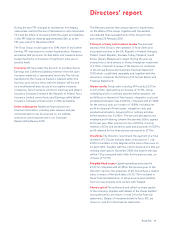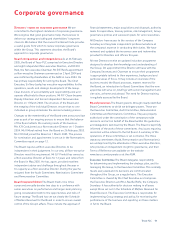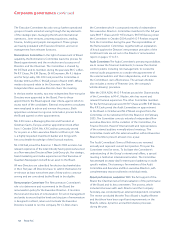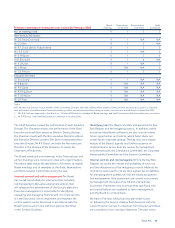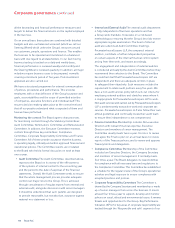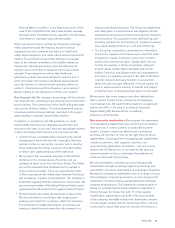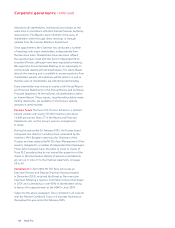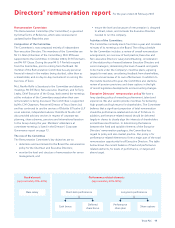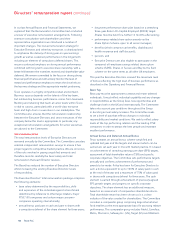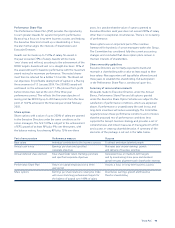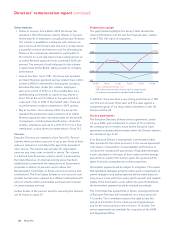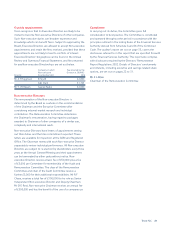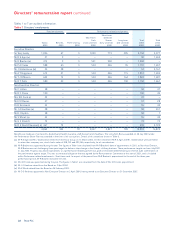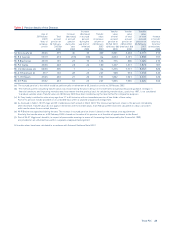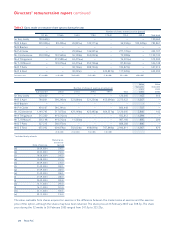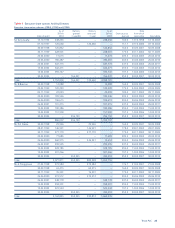Tesco 2005 Annual Report Download - page 17
Download and view the complete annual report
Please find page 17 of the 2005 Tesco annual report below. You can navigate through the pages in the report by either clicking on the pages listed below, or by using the keyword search tool below to find specific information within the annual report.Tesco PLC 15
Steering Wheel. In addition to the Board discussion of the
work of the Committee that takes place at least annually,
the Chair of the Committee reports regularly to the Executive
Committee on corporate responsibility matters.
Other specialist functions, notably the Corporate and Legal
Affairs department and the Trading Law and Technical
department provide assurance and advice on health and
safety, legal compliance and social, ethical and environmental
matters. These functions report their findings on a regular
basis to the relevant committees and escalate matters as
appropriate. Subsidiary businesses also maintain key risk
registers and confirm their compliance with Group policies
annually. These statements confirm that the Board’s
governance policies have been adopted in practice and in
spirit. For certain joint ventures, the Board places reliance
upon the systems of internal control operating within our
partners’ infrastructure and the obligations upon partners’
Boards relating to the effectiveness of their own systems.
Non-financial risks We manage a broad range of financial and
non-financial risks, including social, ethical and environmental
responsibilities. The construction of the Key Risk Register takes
into account all these matters. The risk management policies,
procedures and monitoring methods described in this report
apply equally to corporate responsibility activities.
In addition, in accordance with ABI guidelines on social
responsibility, the Group has dedicated specific time and
resource to this area. In our view, there are appropriate controls
in place to manage both financial and non-financial risks.
• Customer focus is fundamental to delivering the overall
strategy and is key to the way risk is managed. Business
practices centre on serving the customer and in meeting
those challenges the Group recognises its responsibility
to deliver safe, quality products at the right price.
• We recognise that our people may have to face ethical
dilemmas in the normal course of business and our
guidance to them stems from the Tesco Values. The Values
set out the standards that the Board wish to uphold in
how we treat our people. These are supported by Codes
of Ethics and govern the relationships between the Group
and employees, suppliers and contractors. The Compliance
Committee regularly monitors adherence to these codes. We
are a founder member of the Ethical Trading Initiative and a
signatory to the UK Government’s Supplier Code of Practice.
• Excellent health and safety standards are a high priority.
We are committed to providing a safe shopping and
working environment for customers, staff and contractors.
The company has established policies, procedures and
training to identify and minimise the risks inherent in a
retail and distribution business. The Group has established,
over many years, a comprehensive due diligence process
supported by technical and product development standards
and procedures. This assurance covers staff training, and
providing guidance for, and auditing of, suppliers to ensure
they supply quality products in a safe and ethical way.
• The Group has conducted a comprehensive risk analysis
of products, suppliers and factories upon which the audit
programme is based. Auditing is carried out on both a
routine and unannounced basis. Supply chain risks can
include, for example, a failure of standards relating to
product safety, quality, labour standards and animal
welfare. Technical, due diligence and crisis management
procedures are regularly reviewed in the light of the latest
scientific research and expert opinion, to ensure that
these risks are managed effectively. In-house experts are
used as well as external advisors to look for and analyse
emerging issues so that appropriate action can be taken.
We recognise that some investors and other stakeholders
take a specific interest in how companies are managing
non-financial risks. We report further detail on our approach,
policies and KPIs in this area in our Annual Corporate
Responsibility (CR) Review and on our website,
www.tesco.com/corporate
Relations with stakeholders We recognise the importance
of understanding stakeholder views and the need to balance
their opinions in order to achieve a sustainable business
model. Customers need to be able to trust our business
and they will only trust us if we do the right thing by all our
stakeholders. Our programme of engaging with stakeholders,
including customers, staff, suppliers, investors, non-
governmental organisations and others, is set out in more
detail in the CR Review and on our website. We carry out
external research to help us understand how well we are
communicating with these groups.
We are committed to maintaining a good dialogue with
shareholders through proactively organising meetings and
presentations, as well as responding to a wide range of enquiries.
We want to understand shareholder views on a range of issues
from strategy to corporate governance, and we recognise the
importance of communicating appropriately any significant
company developments. This shareholder communication is
mainly co-ordinated by the Investor Relations department.
During the year, the Group met with 75 of the leading
shareholders, representing over 42% of the issued shares
of the company. Inevitably institutional shareholders, may be
in more regular contact with the Group than others, but care
is exercised to ensure that any price-sensitive information is


